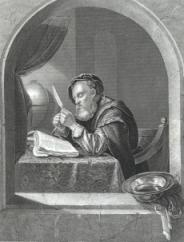In a morning marked by the dissension and controversy about an increasingly unpopular war, I was pleasantly surprised to learn in church this morning the background of one of my all-time favorite Christmas songs, Oh Holy Night. Considering myself to be well-versed on the social aspects of the gospel, I was intrigued to hear that the song was written by a socialist wine-seller, the music by a Jew, and the English translated by an ardent abolitionist. The song premiered at midnight mass on Christmas 1847 in Roquemaure, France. Even though it was a very popular Christmas song in France, at one time it was banned for use in catholic churches. The problem with the song was that the author, Placide Cappeau, had became, according to one web-site, " a social radical, a freethinker, a socialist, and a non-Christian." The article goes on to say that later in his life, "he adopted some of the more extreme political and social views of his era, such as opposition to inequality, slavery, injustice, and other kinds of oppression." Certainly doesn't sound very Christian by many of today's definitions.
John S. Dwight translated it into English in 1855. Dwight was a Transcendentalist, a "commune"ist (see Brook Farm, MA), an abolitionist, and one of the foremost critics and proponents of classical music of his day. The song was very popular in the churches of the North during the civil war for obvious reasons.
There is a great deal of folklore which has been attached to the song. It is credited with being the song sung to begin the Christmas day truce of the Franco-Prussian War. It may have been the first song ever broadcast by radio. It was sung by me at one of my earliest public performances. (All right, it was at an 8th grade piano recital. The fact that they asked me to sing rather than play is indicative of my lack of skill at the piano. To paraphrase one of my favorite movie characters, "Eight years of piano down the drain.")
As we continue to debate the significant and not-so-significant issues of our day, it is good to stop and remember that "yonder breaks a new and glorious morn."
Subscribe to:
Post Comments (Atom)





No comments:
Post a Comment